Switching Single-use to Sustainable: How Reusable Caps are Helping Towards the NHS Net Zero Goal

On the journey to delivering a net zero NHS, new innovations and sustainability projects are popping up in hospitals across the nation. Switching from single-use items to sustainable options is just one of the ways that the healthcare sector is working towards a carbon-free healthcare system.
The NHS is responsible for around 5% of carbon emissions in the UK, and in Scotland. An important step on this mission has been the introduction and user-testing of reusable theatre caps in some hospitals, which have become a more common option for healthcare staff.
The use of single-use products is just one of the elements of the NHS that is significantly contributing to the carbon footprint of the healthcare industry – with an estimate of 100,000,000 single-use caps reported ending up in landfill in 2023 (Eco Ninjas), which works out to be approximately 4 every single second.
Not only are disposable theatre caps a huge environmental issue, but they also contribute to staff health risks. Single-use caps have been linked to chronic heart disease, cancer, skin conditions, as well as discomfort in the theatre environment – so it’s no wonder that industry professionals are looking for alternatives to counteract this.
Scotland’s first plant-based theatre cap co-design project
2025 kicked off with a new and exciting theatre cap co-design project popping up in Scotland, one of the most recent reusable cap creations, and the first in Scotland. The project is focused on unique plant-based biodegradable caps, co-designed by researchers at Design HOPES and the Golden Jubilee University National Hospital, in Clydebank, near Glasgow.
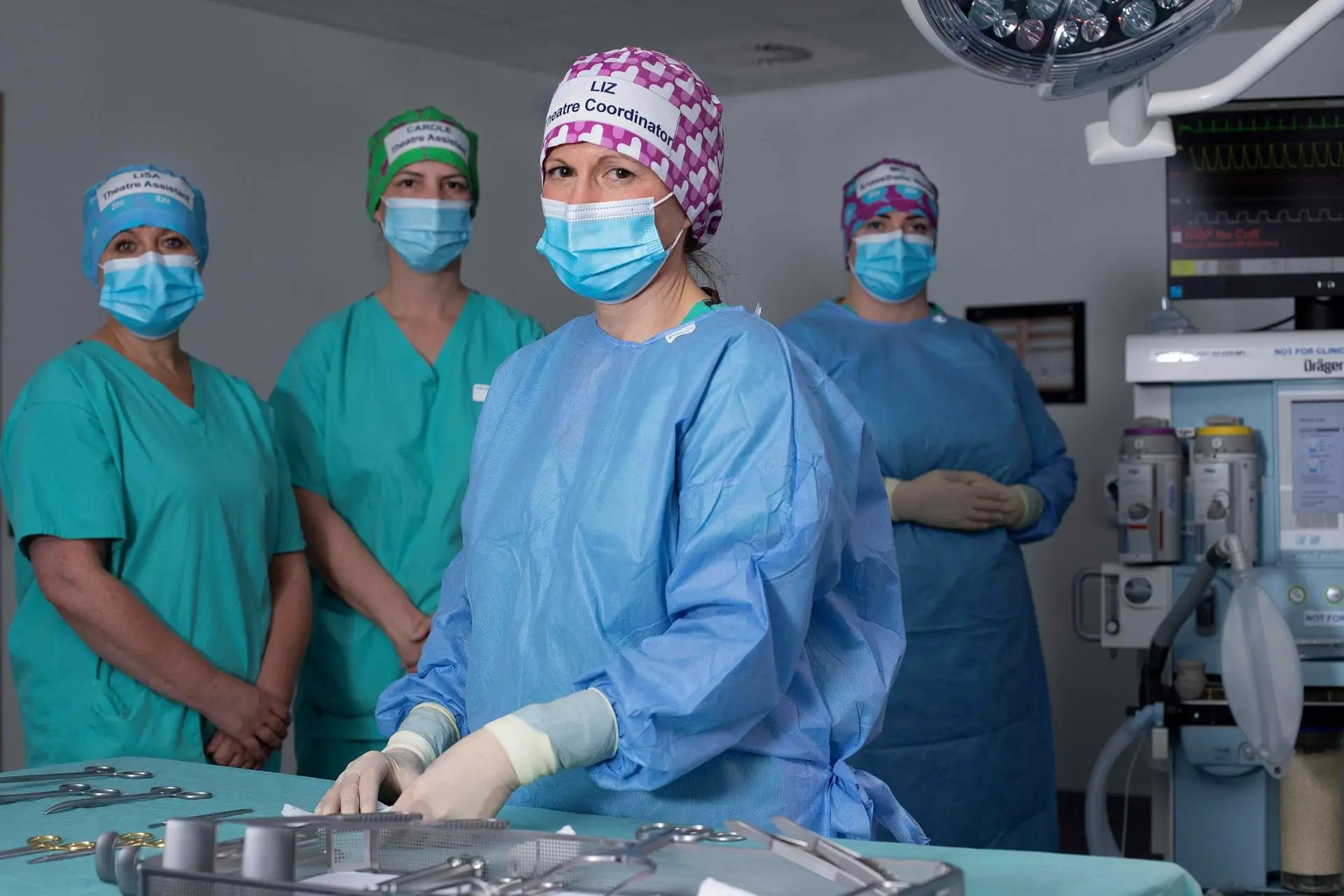
Credit: Marsaili Mainz/PA
The theatre cap project is part of the wider Design HOPES research funded by the UK’s Arts and Humanities Research Council (AHRC). Design HOPES was recently awarded more than £4.6M by the AHRC as one of four Green Transition Ecosystem (GTE) Hubs in the UK. Their overall aim is to address distinct challenges related to the climate crisis including, such as realising net zero goals.
The newly designed hospital caps are biodegradable and made from plant-based cellulosic fibre. They are colour-coded for staff in different specialities and use first names and job roles, to aid with identifiability in busy clinical environments – a benefit for staff and patients alike.
Led by the University of Strathclyde and Heriot-Watt University, the AHRC funded project has created these sustainable caps in a trial batch to address hospital medical waste and help tackle environmental challenges in healthcare. Two of the Professors heading up the project are Paul Rodgers, Professor of Design at University of Strathclyde, and Dr Euan Winton, Assistant Professor of Design at Heriot-Watt University.
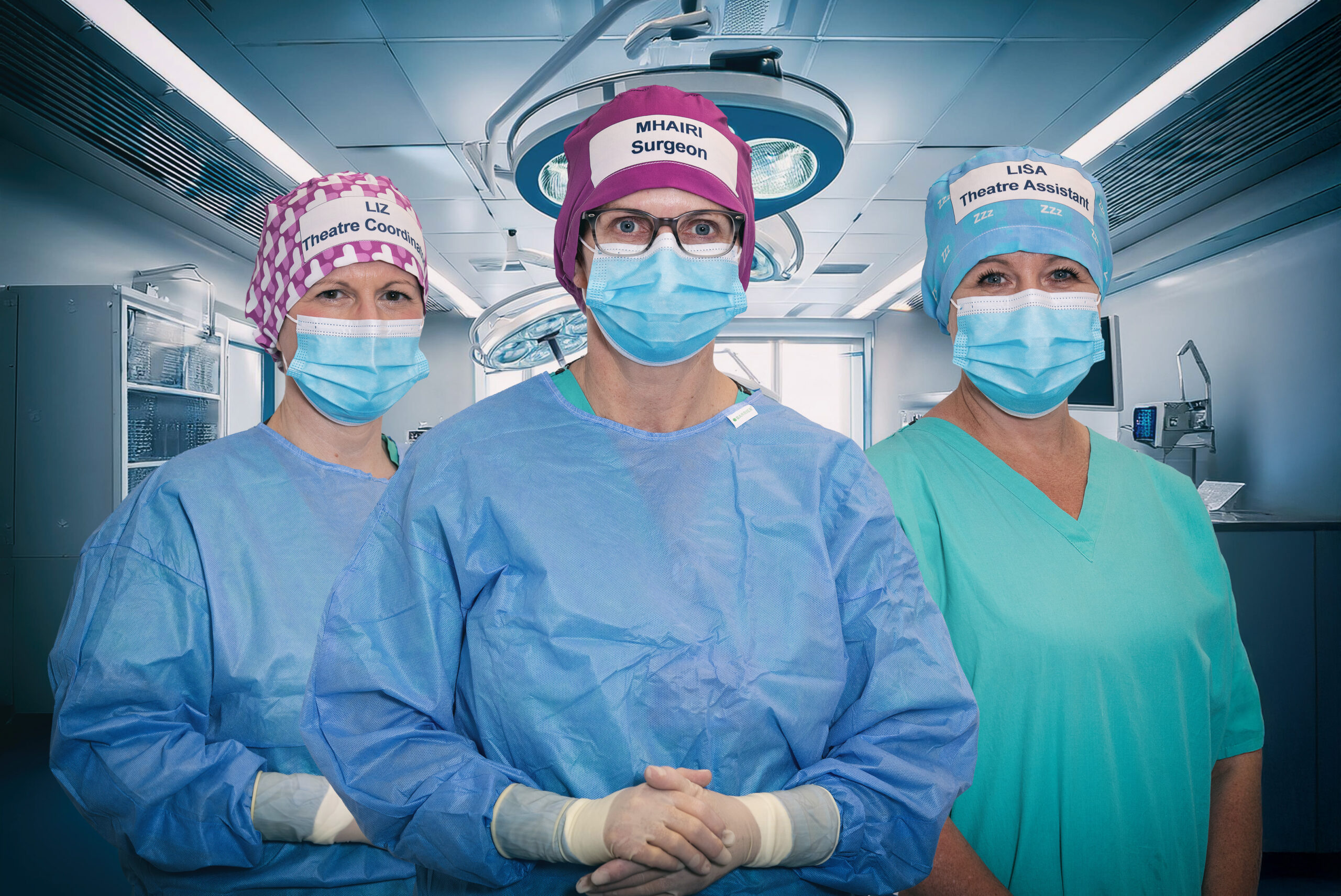
Credit: Marsaili Mainz/PA
According to Heriot Watt, around 800,000 single-use caps are used and discarded every year in Scottish hospitals, which may take up to 300 years to decompose.
Discussing the mission for the theatre cap project, Paul said:
The health of the planet is inextricably linked to the health of its people. We wanted to design with care and create something with care front in mind. These caps have been driven by an environmental agenda, but now we can see, you know, clear socio-economic impacts as well.
Obviously, the caps are part of the mission to create a greener NHS, but they have a dual purpose. In hospital theatres “miscommunication and misidentification in that context can be catastrophic” Paul continues, “And sadly, you know, those mistakes can happen, but this (project) has the potential to massively reduce this risk.”
“Up to 70% of women in theatre settings have been misidentified”
Dr Euan Winton added:
Up to 70% of women in theatre settings have been misidentified, and that misidentification can be related to incidents within theatre settings. So, the clearer we can identify people, the quicker we can improve patient safety. One suggestion at first was that names go up on a board. But if there are agency staff, and in these high-pressure situations, a name can go out the window and you don’t have time to search for that.
One of the key focuses for Paul, Euan and the team of researchers during the conception of the caps, was to work closely with staff at the NHS Golden Jubilee hospital, to ensure that the caps were influenced by the people that would actually be wearing them.
When discussing the wider positive implications of the cap implementation into the Golden Jubilee hospital, Carole Anderson (Director of Transformation Strategy at NHS Golden Jubilee), said:
Some staff felt they (single-use caps) were uncomfortable, that they didn’t fit well because, effectively, it’s sort of one size fits all, and it’s so important that you’re able to cover your head properly for infection control purposes in a theatre environment. So, we spent a lot of time talking to staff about their experiences, what they liked or didn’t like about the existing caps. The staff were also keen to see how they might be able to use the caps to identify with their first name and colour or a design to identify the speciality that they belong to.
Anderson continued:
This would be beneficial both from a safety perspective, that would help communication, which also because the caps could be designed to look a bit brighter or more approachable – that patients seeing the staff prior to coming into theatre might feel a little bit more at ease, rather than seeing something that’s very clinical and sterile.
The Royal Liverpool University Hospital’s Mission to Increase Sustainability
As we know, reusable hospital items and products aren’t a brand-new invention – there have been trials and creations over the years following the same mission. Back in 2019, Dr Mruga Diwan, Anaesthetist at Royal Liverpool University Hospital, was looking into recycling and sustainability in her department, and thought of the concept of introducing reusable caps – but due to COVID, the idea was put on the back burner.
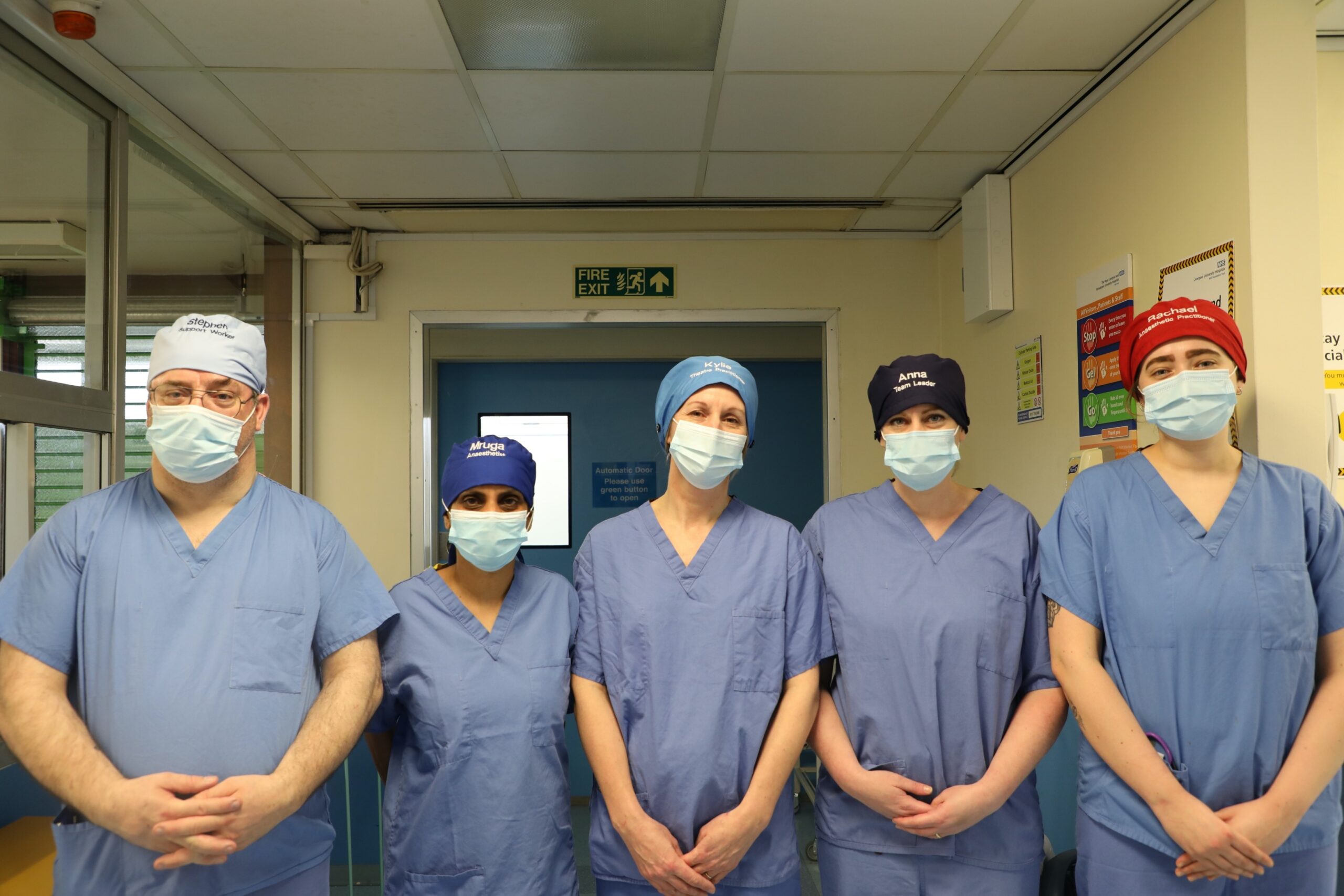
Dr Mruga Diwan (second left) and team at The Royal Liverpool Hospital
Discussing the drive behind implementing reusable caps into the Royal Liverpool University Hospital, Dr Diwan explained:
We now have a new hospital, with 18 theatre units, and our usage of caps was more than about 100,000 disposable caps per year. That came to a financial cost of about £25,000 a year. So, there’s a major cost implication.
Then when you look at how disposable caps are made, firstly the natural content of a disposable cap is viscose, and to manufacture disposable caps involves cutting down trees. Secondly, the harsh chemicals that are used in the manufacture of disposable caps have been linked with chronic heart disease, cancer and chronic skin conditions, and lastly, a very important role of named reusable caps is the communication aspect as it is a well-known fact that about 70% of adverse events in the health care system are related to miscommunication.
In the Centre for Sustainable Healthcare report Tackling Excess Waste by Switching to Reusable Theatre Caps, led by Dr Diwan, it is reported that the total savings of using reusable caps over 2 years was estimated to be £28,202, and over 3 years was £53,202.
Eco Ninjas – Enhancing Safety and Alleviating Patient Anxiety
Towards the end of 2020, Dr Diwan was approached by Danielle Checketts, Owner of Eco Ninjas (formally Warwick Med) with the idea to trial reusable caps in The Royal Liverpool University Hospital – both with the same mission to ease the NHS’ environmental impact and increase patient safety.

Danielle Checketts
While training an operating theatre team, Checketts was inspired to create Eco Ninjas (formerly Warwick Med) after being asked to write her name and role on a disposable theatre cap. Eco Ninjas mission was to help hospitals embrace sustainability and enhance patient safety by enabling transition from disposable theatre caps to reusable name and role theatre caps.
The Eco Ninjas team have spent over 3 years supplying reusable theatre caps to NHS hospitals across the UK, collaborating with universities, expert test engineers, consultants and sustainability experts.
Due to the complex nature and waste of bespoke embroidery (when staff leave, non-one else can wear an embroidered cap), Eco Ninjas have innovated a new way to attach a name badge to a reusable theatre cap. The badges can be easily and quickly detached from the hats, and cleaned properly for hygiene purposes and to ensure adequate infection control protocols can be used.
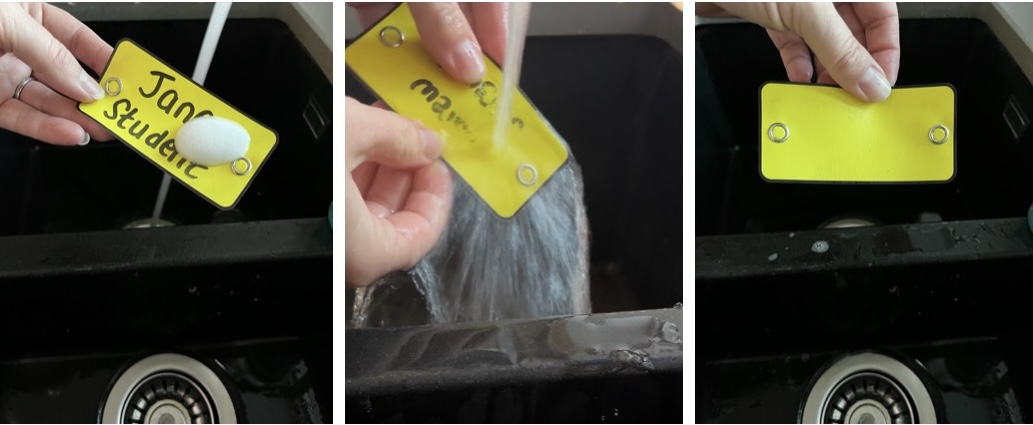
Credit: Eco Ninjas
Checketts explained:
The practicality of detaching the badge from the hat can also ensure that the fabric hats can be laundered without the badges, at the adequate temperatures required to clean the hats effectively, similar to how scrubs are laundered.
The specially designed polyurethane digitally printed badges can withstand exposure to multiple cleaning solutions used in healthcare, so they are long lasting and they can also be cleaned using soap and water to save the waste associated with detergent wipes (which has a carbon footprint similar to that of a disposable cap). The highly visible badges, situated in the best position to be easily read- on the forehead, above where eye contact is made, can be worn by all visitors to operating theatres as well as staff, so including students, birthing partners and representatives, identifying every person in the room is critical to improving communication, reducing hierarchical barriers and ultimately, enhancing patient safety.
The caps were created with a focus on sustainability, safety, and inclusivity. Checketts and her team created the reusable caps to be as inclusive and diverse as possible, offering different sizes and shapes for different hair types and needs. Speaking on the importance of diverse caps Danielle said:
Some staff have said that it’s very stressful in theatre if they have to get scrubbed up quickly in an emergency. It could take around 20 minutes to get their hair into three, or four, disposable hats. Sometimes, by doing that, it would really pull on the wafer-thin viscose disposable hat, and then during surgery, sometimes the hats tore, and if they tore, they’d be thrown out if their hair wasn’t covered.
Creating a Range of Fully Inclusive Reusable Badge Caps
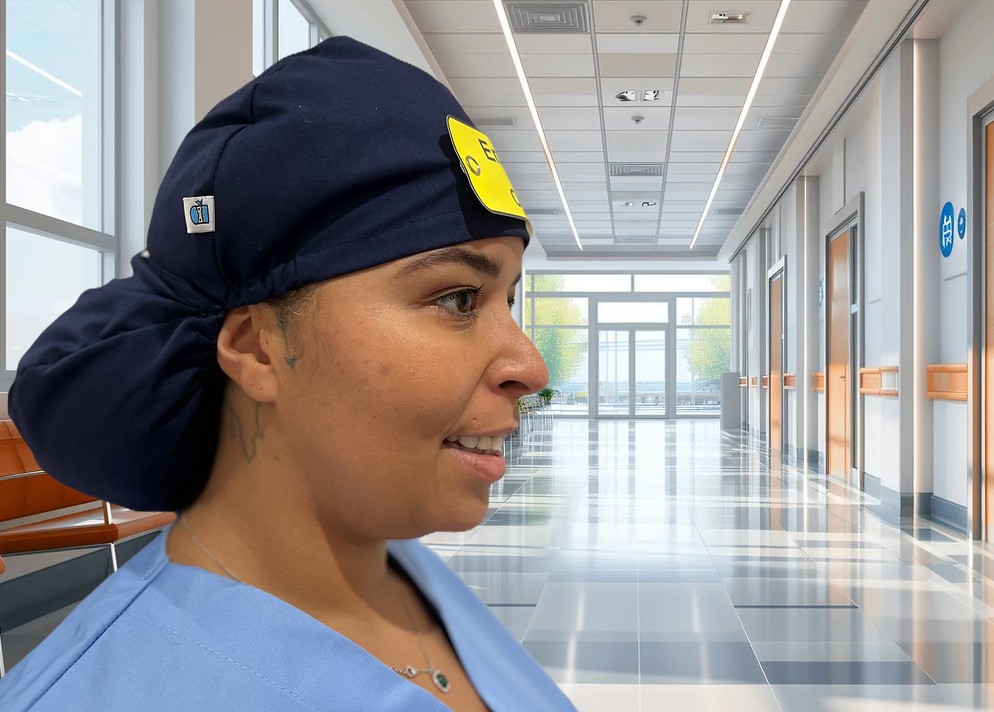
Credit: Eco Ninjas
Checketts continues:
Many clinicians with Afro-Caribbean hair have left because of it; some people have had to cut their hair. No one should ever have to do that. So, to have a bespoke product which can hold hair properly, which is also a comfortable way of wearing the hair up high for eight to ten hours a day is definitely needed. Wearing hair braids up in certain ways can pull on the hair follicles, and it can cause conditions like traction alopecia and it can cause headaches. We want people to be as comfortable as possible, so we invented two types of hats for hair braids. We have hats that can tie back and hold all of their hair, and it holds it in place at the back and on top of their head. We’re also developing a hijab at the moment too.
Linking back to the patient safety aspect of the caps, and alleviating patient anxiety, during the trials of the theatre caps in the Royal Liverpool Hospital, Dr Diwan and Checketts were passionate about ensuring the benefits for the patients were clear and that the feedback reflected this.
In Dr Diwan’s 2022 report, she interviewed team members at the hospital on their experience in the testing process. One theatre staff member commented that “Patients know who they are interacting with, which allays their anxiety”, whilst another reiterated: “It enables clear communication, especially in emergencies where timing is key to communicate with specific individuals and calling by name is important”.
What’s the Future for Delivering a Net Zero NHS?
The rise of reusable and sustainable products within healthcare, and specifically theatre environments, is just one of the greener choices that healthcare professionals and researchers are creating and utilising.
Reflecting on the implementation of reusable caps across the UK – from the newest plant-based reusable caps to Eco Ninjas inclusive caps, the benefits are clear, and the work is being done to user test different options for sustainability within hospitals.
According to Dr Diwan, there are other eco-friendly options on the rise in Liverpool Hospitals (as well as others across the country), such as: the transition from IV paracetamol, to Oral Paracetamol in Liverpool hospitals, the use of cool sticks to test nerve blocks, instead of Ethyl Chloride spray, and looking towards reusable gowns in the future too.
These projects and possibilities are steppingstones towards a greener NHS and outline the innovative ways in which Hospitals and researchers are working together to deliver a net zero NHS plan.

